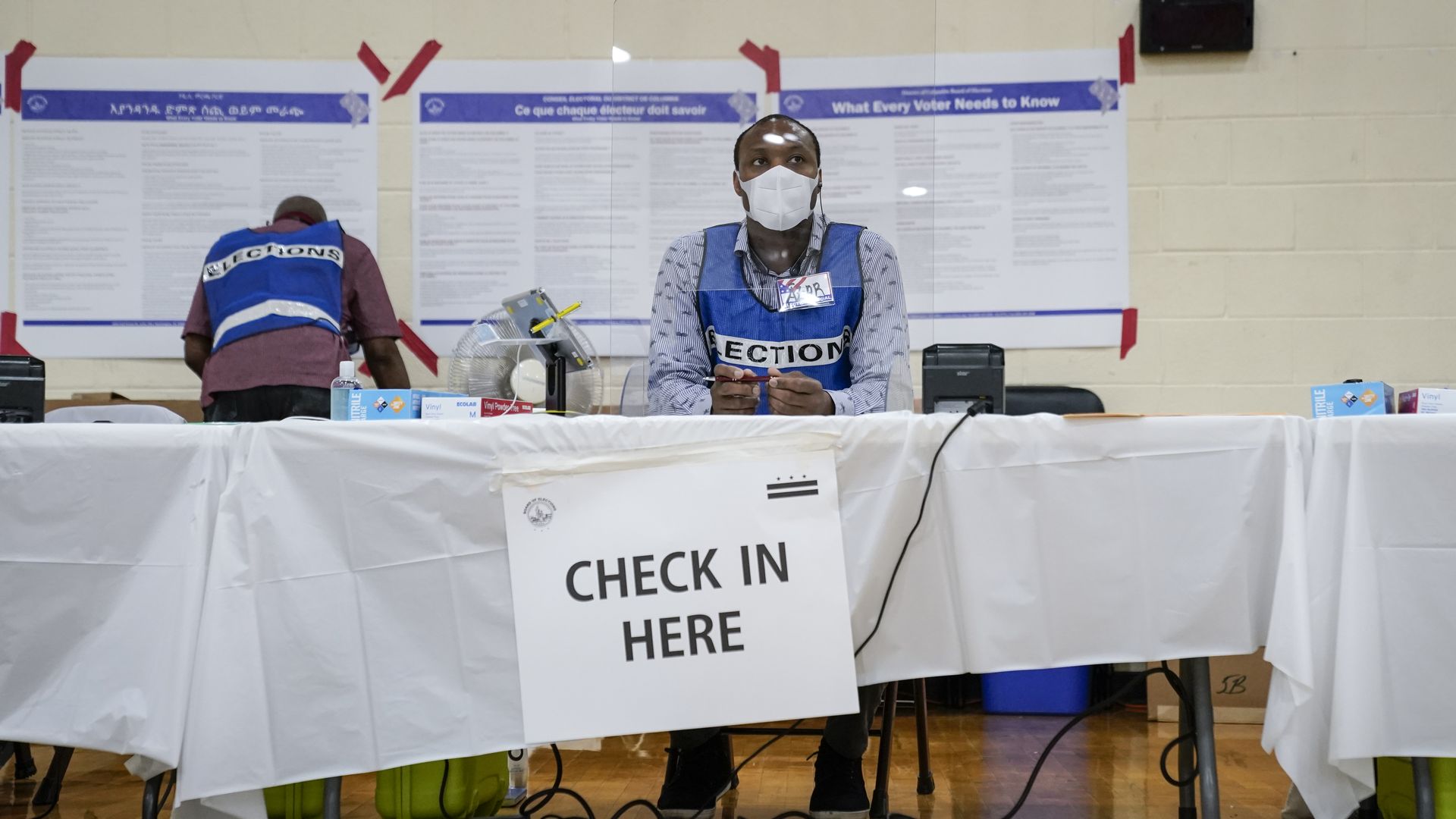Primary elections test impact of protests, coronavirus on voting
Add Axios as your preferred source to
see more of our stories on Google.

Election official at a polling place at McKinley Technology High School in Washington, D.C. Photo: Drew Angerer/Getty Images
In the midst of a global pandemic and national protests over the death of George Floyd, eight states and the District of Columbia held primary elections on Tuesday.
Why it matters: Joe Biden, the presumptive Democratic nominee, needs to win 425 of the 479 delegates up for grabs in order to officially clinch the nomination. There are a number of key down-ballot races throughout the country as well, including a primary in Iowa that could determine the fate of Rep. Steve King (R-Iowa).
The big picture: Perhaps above all else, however, the primary will serve as a test of how the ongoing threat of the coronavirus will affect turnout, and whether mass mail-in voting will be viable for use in November. It also comes with the backdrop of continuing civil unrest in cities across America.
- Primaries took place in D.C., Indiana, Iowa, Maryland, Montana, New Mexico, Pennsylvania, Rhode Island and South Dakota.
- As of 10:30 pm ET, Biden had been declared the winner of Indiana, Maryland, Pennsylvania, Rhode Island, New Mexico, South Dakota and Montana.
Key races:
- Iowa's 4th district: Rep. Steve King, who was stripped of his committee assignments in 2019 due to his history of racist remarks, was defeated by state Sen. Randy Feenstra.
- Iowa U.S. Senate: Theresa Greenfield, the candidate backed by Senate Democrats’ campaign arm, beat out four other Democrats for the chance to challenge Sen. Joni Ernst, one of the most vulnerable Republicans in the Senate.
- Montana governor: Rep. Greg Gianforte, who won a special election in 2017 after being charged with assaulting a reporter, clinched the Republican nomination in the race to succeed Gov. Steve Bullock (D). Bullock won the Democratic primary for U.S. Senate and will face incumbent Sen. Steve Daines.
- Ferguson mayor: The Missouri city where the 2014 death of Michael Brown helped catalyze the Black Lives Matter movement elected its first black mayor, Ella Jones.
- Maryland's 7th district: Rep. Kweisi Mfume, who won a special election to fill the seat of the late Rep. Elijah Cummings, defeated more than a dozen candidates — including Cummings' wife Maya Rockeymoore Cummings — and looks set to win a full term in November.
- New Mexico's 3rd district: Teresa Leger Fernandez won easily in a Democratic primary that gained national attention due to the candidacy of Valerie Plame, a former CIA operative whose identity was famously leaked during the Bush administration.
The mechanics: Some polling sites in Washington, D.C.'s voting experienced confusion and mixed messages from police officers as the city balanced a 7 p.m. curfew with polls closing at 8 p.m. Some voters were reportedly still standing in line as of midnight, with lines extending several blocks while election officials limited the number of residents who could vote at once.
- Pennsylvania's secretary of state said that despite some challenges, the election overall went smoothly and that approximately 1.8 million Pennsylvania voters were approved to vote by mail-in and absentee ballot — 17 times greater than the number in 2016.
- Rhode Island saw some confusion with polls closing at 8 p.m. and varying curfews striking at both 8 and 9 p.m. in cities throughout the state, Go Local Prov reports.
- Indiana dealt with unusually long wait times and delays, per the Indy Star. Many voters say they requested absentee ballots but didn't receive them in time — or at all.
- New Mexico, by contrast, saw few lines as voters took advantage of mail-in ballots, per Las Cruces Sun News.
- Iowa, like other states, drastically extended its mail-in voting access this election, resulting in 474,427 mail-in requests, per We Are Iowa.
- Montana's all-mail-in election had already broken primary turnout records by Monday evening, with 341,400 ballots being submitted, per KTVH. The previous record, which was set in 2016 and included in-person voting, was 293,548.
- Maryland voters were motivated to turn out Tuesday following tense protests over racial inequality, the Baltimore Sun reports.
- In South Dakota, nearly five times as many voters used absentee ballots compared to 2016, the Argus Leader reports.
This story is developing. Please check back for updates.

